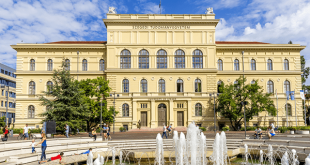In recent years, Hungary has emerged as a favorite destination among international students. This captivating Central European country has so much to offer to future scholars, including a quality education but also a relatively affordable cost of living. This guide will delve into the various aspects of the cost of living in Hungary for students. Our aim is to help you make informed decisions and better manage your finances if you plan to live and study in Hungary.
Note: The currency in Hungary is the Hungarian Forint (HUF). 1 EUR is about 381 HUF.
Tuition Fees in Hungary for International Students
One of the main reasons why international students choose to study in Hungary has to do with the affordable education cost. Tuition fees can vary significantly based on the degree level, program, and of course whether the institution is a public or a private one. Public universities generally have lower fees compared to private institutions. Make sure, therefore, to research beforehand and make it a priority to compare the costs of different universities.
On average, tuition fees for international students range from 2,800 to 7,500 euros per year for bachelor’s and master’s degrees. Doctoral programs are often even more budget-friendly. The most expensive courses are, no surprise, medicine and dentistry studies. Engineering in Hungary, on the other hand, ranges between 1,600 and 2,500 euros per year. Additionally, business schools cost around 1,200 euros per year.
Moreover, most universities in Hungary request students to pay a year of tuition fees in advance. They usually have to do so once they get admission at a university in Hungary, prior to the visa application process. In addition to tuition, consider other academic expenses such as textbooks, study materials, and laboratory fees. These costs can amount to around 500 to 800 euros annually.
You can check out the best Hungarian universities’ official websites in our article here.
Accommodation Costs
Including rent, students should budget around 600 to 800 euros per month for living expenses in Hungary. Accommodation options include on-campus dormitory and off-campus housing.
On-Campus Housing: Student Dormitory in Hungary
One of the primary factors influencing your cost of living as a student in Hungary is accommodation. On-campus housing is a popular choice for its convenience and community atmosphere. It’s also the most affordable option. Depending on the university and the type of room you choose, monthly costs can range from 50 to 80 euros per month. These accommodations often provide basic amenities such as utilities, internet, and communal spaces.
Off-Campus Accommodation
Alternatively, many students opt for off-campus apartments, offering more independence and a broader range of options. You have the choice between a private apartment and a shared flat where you share the living space with other fellow students. In this case, you can expect to spend between 100 and 300 euros per month, including the utility costs.
In cities like Budapest, renting a private apartment can cost around 520 euros per month. It’s advisable to explore different neighborhoods and consider shared apartments to reduce costs. Moreover, in other cities, the rent for a private flat costs between 250 and 370 euros per month. These prices include utilities.
Food, Daily Essentials and Transportation
Hungary is known for offering some affordable food options. Students can explore local markets and supermarkets to find budget-friendly ingredients. Cooking at home is generally more budget-friendly than eating out regularly. And when it comes to transportation, getting around Hungary is both convenient and economical.
Groceries and Meals
Managing your daily expenses is crucial for maintaining a comfortable student life. On average, students spend approximately 50 to 100 euros per month on groceries. Make sure to explore local markets for fresh produce and cost-effective ingredients. Moreover, a meal at an inexpensive restaurant can cost between 5 and 10 euros.
Transportation
Hungary boasts an efficient and well-connected public transportation system, including buses, trams, and metros. Additionally, in Budapest, there are suburban railway lines called HÉV as well as boat services.
A monthly transportation pass costs around10 to 15 euros and provides unlimited access to these services. This is another cost-effective option for getting around the city and commuting to your university, as you can get a student discount.
Other means of transportation in Hungary is the public-bike sharing, which costs 3 euros in Budapest and 1 euro elsewhere, for a 30-min fare. A single ticket, in case you take an urban public transportation, costs 1 euro.
Recreation and Entertainment
Setting aside a budget for leisure and cultural activities, as well as entertainment, is essential for maintaining a healthy work-life balance.
Cultural Experiences
Living in Hungary provides a wealth of cultural experiences, from exploring historical sites to enjoying local festivals. Many museums and cultural attractions offer discounted rates for students. This allows you to immerse yourself in the rich heritage of the country without breaking the bank.
Leisure Activities
Whether it’s enjoying a cup of coffee at a café or attending social events, allocating around 50 to 100 euros per month for recreational activities is reasonable. A movie ticket with a student discount costs 6 euros in Budapest and 5 euros in other cities. And if you plan to register to a sport club, expect to pay between 30 and 50 euros per month for a monthly subscription.
Hungary Healthcare And Insurance for International Students
Healthcare is a priority, and all international students are required to have a full coverage of health insurance. It’s actually a prerequisite for registration at most universities in Hungary.
The cost of health insurance varies based on your age and coverage preferences. It also varies depending on whether you are an EU or non-EU citizen. Nationals from the EU can benefit from their European Health Insurance Card (EHIC) which entitles them the same coverage as any citizens of a member state. Moreover, the EHIC covers the medically necessary services (such as dialysis), and does not authorize the use of deferred care.
Non-European international students, on the other hand, must subscribe to a private medical insurance. Universities such as the University of Pécs offers assistance to students who need an additional insurance. It usually costs around 185 euros annually. Check with the international office of your university to find out about what medical care is included in the contract. Usually, dental care require you to pay an additional amount.
When it comes to medical expenses, any international students who pursue their studies full time at a university in Hungary get free first aid and emergency medical care. Exchange students also are entitled to free medical care – depending on the agreement between their home and host universities.
Part-Time Jobs in Hungary for International Students
International students in Hungary have the opportunity to work part-time while studying, helping offset their cost of living. The government allows students to work up to 30 hours per week during the academic year and full-time during breaks. Engaging in part-time employment can provide a steady source of income to cover various costs.
Yet, an initial 20,000 euros bank balance is a must to get university and student visa acceptance in Hungary. On this matter also, you can check with the international office of your university in Hungary, or check common student job online platforms to find available positions. The monthly minimum wage for unskilled jobs in Hungary is around 430 euros, while the minimum for skilled work, it amounts around 560 euros.
Scholarships and Financial Aid
Hungarian universities and external organizations provide scholarships and financial aid to international students based on academic merit and need. Research thoroughly to identify opportunities that can lighten your financial burden. We’ll delve on the subject in a separate article, but the most common scholarship programs for international students in Hungary include:
- Hungarian State Grant
- MNB Scholarship of Excellence
- National Higher Education Scholarship
- Public Life Scholarship
- Stipendium Hungaricum
Budgeting Tips for Students in Hungary
Managing your finances effectively is key to a successful student life in Hungary. Here are some practical budgeting tips:
- Create a monthly budget and track your expenses meticulously.
- Cook your meals at home more often to save on dining expenses.
- Take advantage of student discounts on transportation, shopping, and cultural activities.
- Explore second-hand stores for affordable clothing and household items.
- Use budgeting apps to monitor your spending and identify areas for improvement.
Conclusion
When getting ready to move to Hungary for education purpose, understanding the cost of living is crucial. Planning beforehand is the best way for students to have a smooth and enjoyable experience, and that’s true for any other foreign country.
From accommodation to academic expenses and daily essential and healthcare, make sure to budget wisely. This will ensure you make the most of your time abroad as a student.
To sum everything up, the cost of living in Hungary remains manageable and affordable for students. By carefully planning and applying some of the tips in this article, you can create lasting memories of your time, enjoying the best Hungary has to offer, and without compromising your financial stability.




 Aljawaz Your guide to study abroad
Aljawaz Your guide to study abroad 








